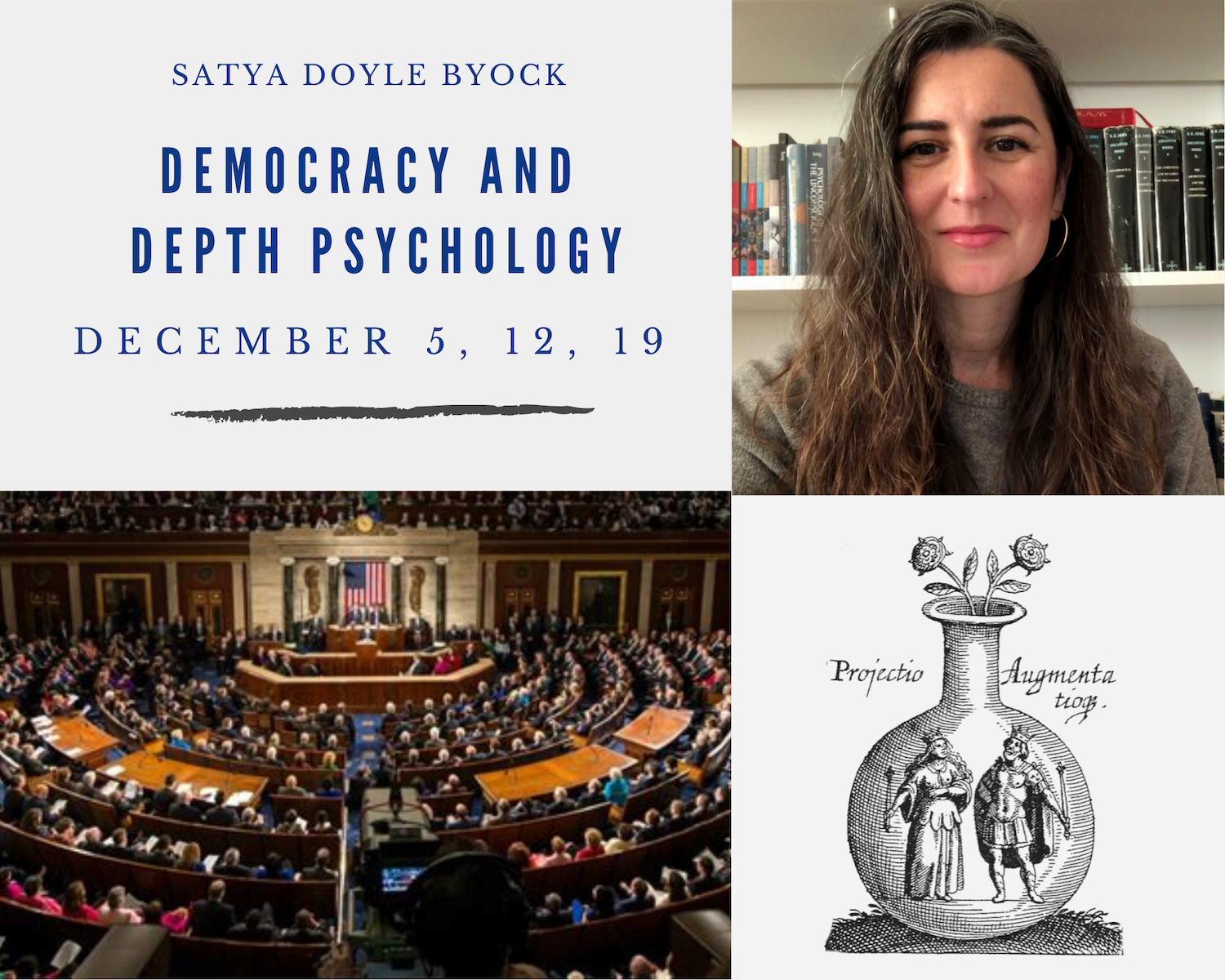Democracy and Depth Psychology
A three-part seminar with Satya Doyle Byock
Sundays, December 5, 12, 19
10 - 12pm PST
All seminars are hosted online. Recordings are provided to all registrants.
Half of all proceeds from this seminar will go to Fair Fight, defending US Voting Rights.
Thank you for your support!
Certificate for Continued Education Credits available, issued by The Salome Institute
“Even today people are largely unconscious of the fact that every individual is a cell in the structure of various international organisms and is therefore causally implicated in their conflicts. ”
Join Salome Institute Director, Satya Doyle Byock, in this three-part seminar exploring the political and social implications of the unconscious through two of the masterworks in the field of depth psychology: Carl Jung’s The Undiscovered Self & Erich Neumann’s Depth Psychology and a New Ethic.
These works were both created following WWII and convey urgent analysis of what occurred within individual psyches to allow “evil” to both spread and take root. They also define what, by contrast, individuals and democracies can do to protect themselves against such events. Authoritarian states and democracies are fundamentally expressions of the collective psychology of individuals.
Participants are encouraged to have a copy of Carl Jung’s The Undiscovered Self, which is widely available. Specific reading assignments will be shared in advance of the seminar. Erich Neumann’s book will be used as a reference in lectures and is not required reading.
Each session will be two hours in length with a short break and allow for lecture as well as discussion.
Attendance at live gatherings is not required. Recordings will be available within 24-hours of the live sessions.
50% of all proceeds from this seminar will go towards supporting American voting rights.
“ It is in the nature of political bodies always to see the evil in the opposite group, just as the individual has an ineradicable tendency to get rid of everything he does not know and does not want to know about himself by foisting it off on somebody else. ”
About Satya Doyle Byock, MA, LPC
Satya Doyle Byock is the founder and Director of The Salome Institute. She is a psychotherapist in private practice and the owner of Quarterlife, a depth psychological resource for people in the first half of adulthood. Satya was previously on staff at the Philemon Foundation, which publishes Jung's unpublished archives, including The Red Book and The Black Books. She has twenty years of practice with The I Ching and dreamwork. Her writing has been published in The Utne Reader, goop, Oregon Humanities Magazine, and the Jungian journal Psychological Perspectives. Her article “Salome: the Antidote” was awarded the Cambridge Jung Circle Essay prize in 2019. She has been interviewed for her work on the goop podcast and elsewhere, and has “mini-therapy” recordings available through the Simple Habit meditation app. Her book on Quarterlife is forthcoming from Random House.
Register:
Online Attendance: a link for Zoom sessions will be sent to all registrants via email.
Recordings: Recordings of the seminar session will be made available to all registered participants.
CEU: Participants can earn 6 CEs — Continued Education Credit hours — for this seminar. Please review this page on Continued Education Credits.
Scholarships & Discounts: It is important to us that this material be accessible. If finances would prevent you from joining us, please send an email with a short note. We would love for you to be able to join.
“What does lie within our reach, however, is the change in individuals who have, or create, an opportunity to influence others of like mind in their circle of acquaintance. I do not mean by persuading or preaching— I am thinking rather, of the well-known fact that anyone who has insight into his own action, and has thought found access to the unconscious, involuntarily exercises an influence on his environment. The deepening and broadening of his consciousness produce the kind of effect which the primitives call ‘mana’. It is an unintentional influence on the unconscious of others, a sort of unconscious prestige, and its effect lasts only so long as it is not disturbed by conscious intention.”

